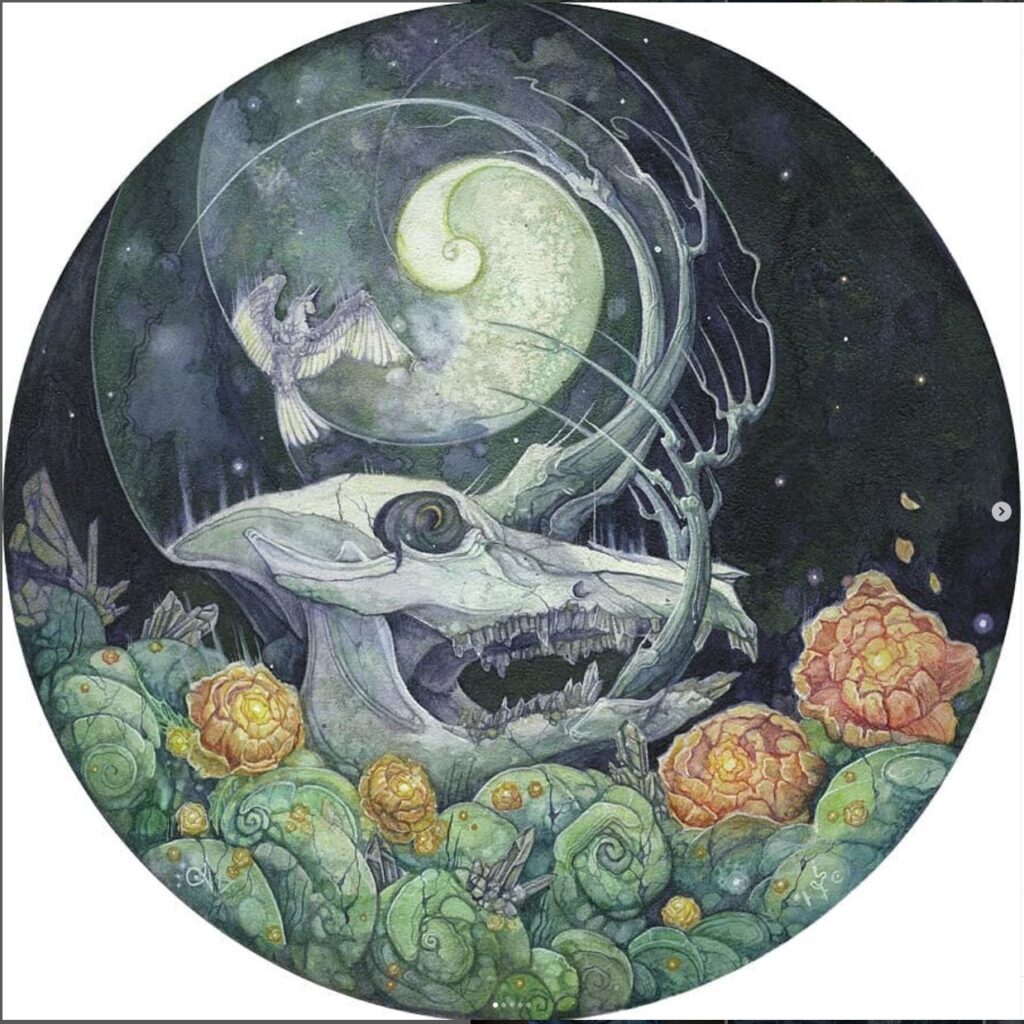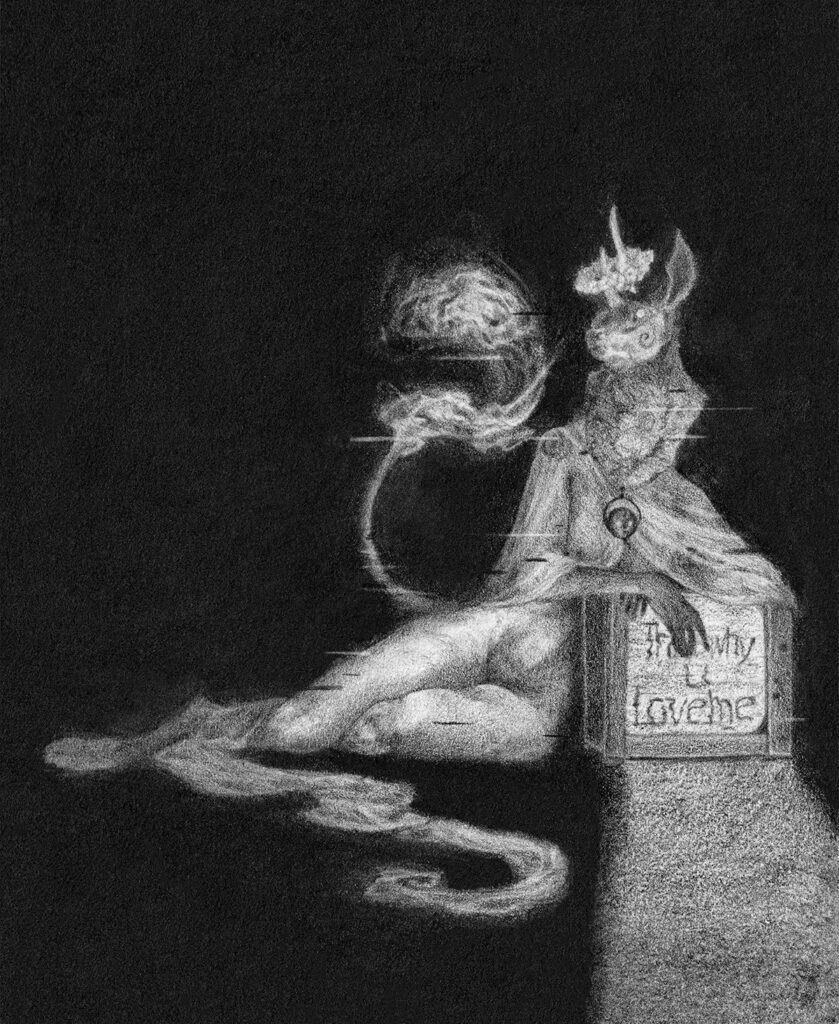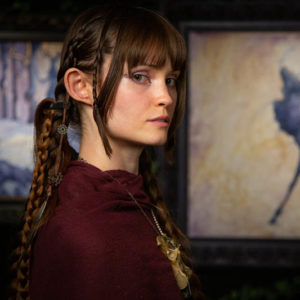
Forager of Dreams: An Interview with Aria Fawn
I am honored to have interviewed Aria Fawn for the first installment of Common Threads: Candid Conversations With Creatives. This series will engage different creators in deep dives into their craft, inspiration, struggles, and passions. I hope these conversations inspire artists—whether seasoned or aspiring—to reflect on their own journeys and find insight or encouragement in the experiences of those who have walked similar paths.
Aria Fawn is a self-taught artist whose dream and nature-inspired evoke surreal imagery of animals and fantastic creatures to explore the emotional experience of being alive. Born in the otherworlds and raised in Colorado, Aria now creates full-time from her home studio in the South of France. Her art aims to evoke wonder and offer a sense of sanctuary in life’s darker moments.
When I saw her art, it struck a very personal chord with me. As someone who also draws a lot of inspiration from the strangeness of dreams, I was awestruck at her ability to capture this surreal quality without losing any of the otherworldy beauty and terror of looking at something you don’t quite understand but can’t take your eyes off of.
She doesn’t rely on any gimmicks to convey this feeling, but rather her art weaves a rich layered tapestry that seems to always be whispering a story. There is a rich vibrancy, a primal honesty to her imagined landscapes that invites the observer into this storytelling process.
Her latest project “Donne Toi la Lune” promises to be an exciting continuation of her storytelling, this time in the form of a fake video game from another reality.
Without further ado, here is the interview!
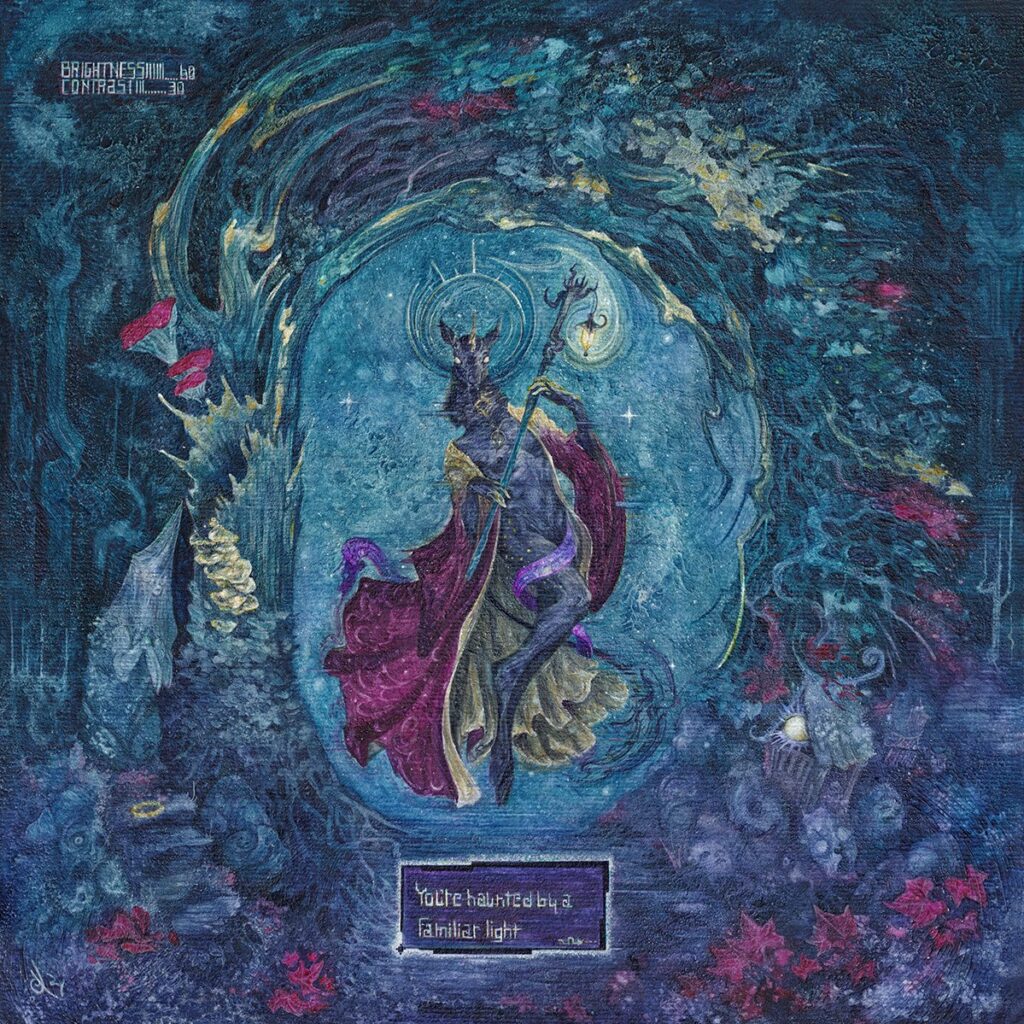
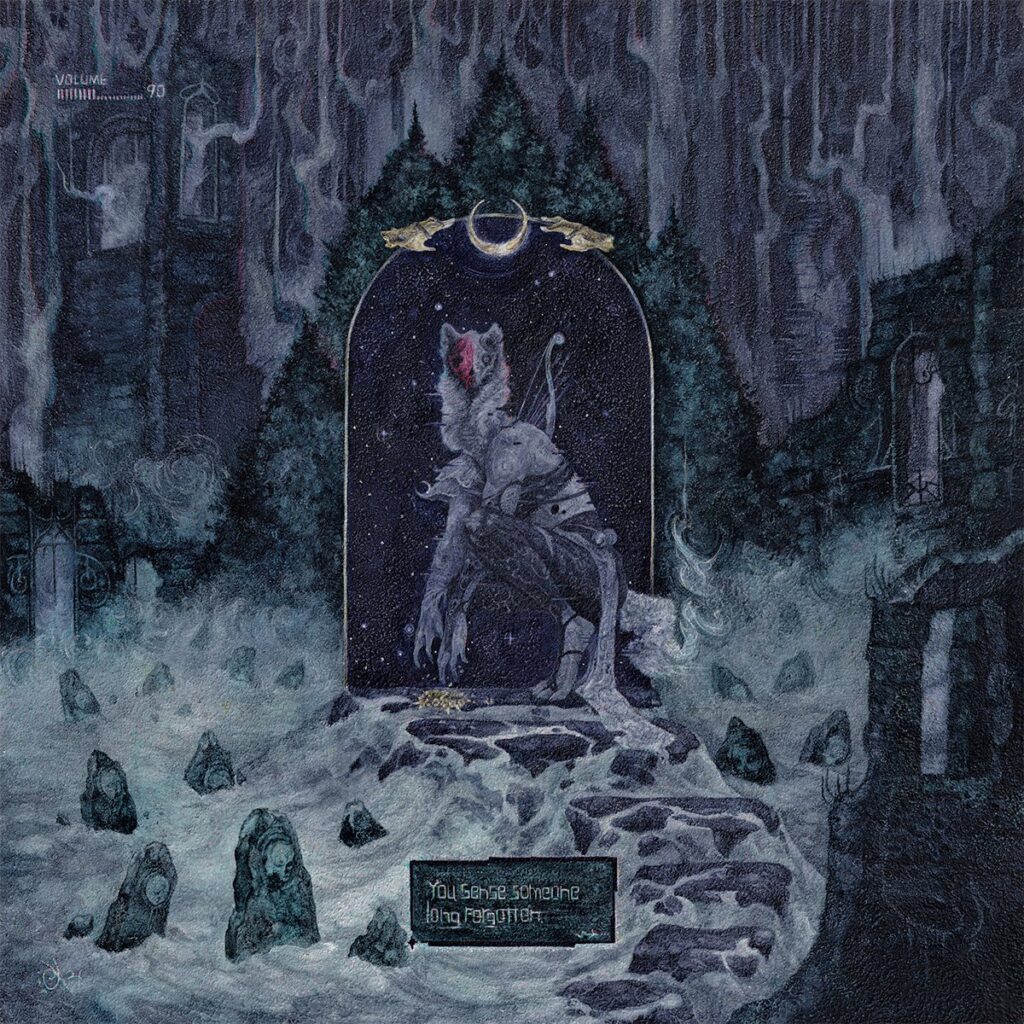
Donne Toi la Lune
I was in a very liminal moment of my life, preparing to move to another country and start over. Something about the concept of a fake game touched me to tears.
You’ve shared some previews of your latest project, Donne Toi la Lune, on your social media pages, and they were my first introduction to your art.
When I saw Haunted by a Familiar Light, I was immediately struck not only by the incredible artistry but also by the intriguing juxtaposition of familiarity and strangeness the piece evokes. The retro RPG video game elements added to the mystery. It feels liminal, as if you’re dreaming of a game from your childhood but it’s been twisted beyond recognition into something beautiful and frightening.
You describe it as “drawn and painted screenshots of a video game from another reality” built upon the inspirations and myths within your art universe.
I love the concept of visually depicting a video game that doesn’t exist, especially one as strange and personal as this. Why did you decide to incorporate video game elements into Donne Toi la Lune?
Thank you so much for the kind words about my project Donne Toi la Lune! My idea for this project came to me after finding out about other fake video games from my favorite YouTube creator Super Eyepatch Wolf, in his video ‘The Bizarre World of Fake Video Games’ I was in a very liminal moment of my life, preparing to move to another country and start over. Something about the concept of a fake game touched me to tears. It just clicked for me.
Growing up, I spent a number of formative years living in a very rural area. I was fairly lonely and kind of a shut-in surrounded by tumbleweeds and the ambiance of air sirens that reminded me of Silent Hill (though they were due to the maximum security prison we lived up the street from.) During this time, I mostly stayed inside making art and playing video games nonstop. The games gave me the world of play I was missing and worked their inspiration into my creations. Over the years, a sort of organic universe of recurring themes, symbolism, and characters developed in my art. When I learned that fake games existed, it seemed like the perfect way for me to tie together so many of the ideas I’ve drawn/written about over the years.
Is there anything about this project or its origins you’d like to share, or will we have to wait for an official update?
Right now, I still consider this project in its early phases, so a lot could change. However, I hope to package it as a small game manual in a case with a soundtrack and eventually release a larger guidebook. I’m currently sharing more in-depth updates about it through my newsletter and on my website.
Where can people go to stay updated or learn more about Donne Toi la Lune?
My website Ariafawn.com and my newsletter (which you can find on my website) are probably the best places, though you can also find me as @ariafawnart or @ariafawn on most social media!
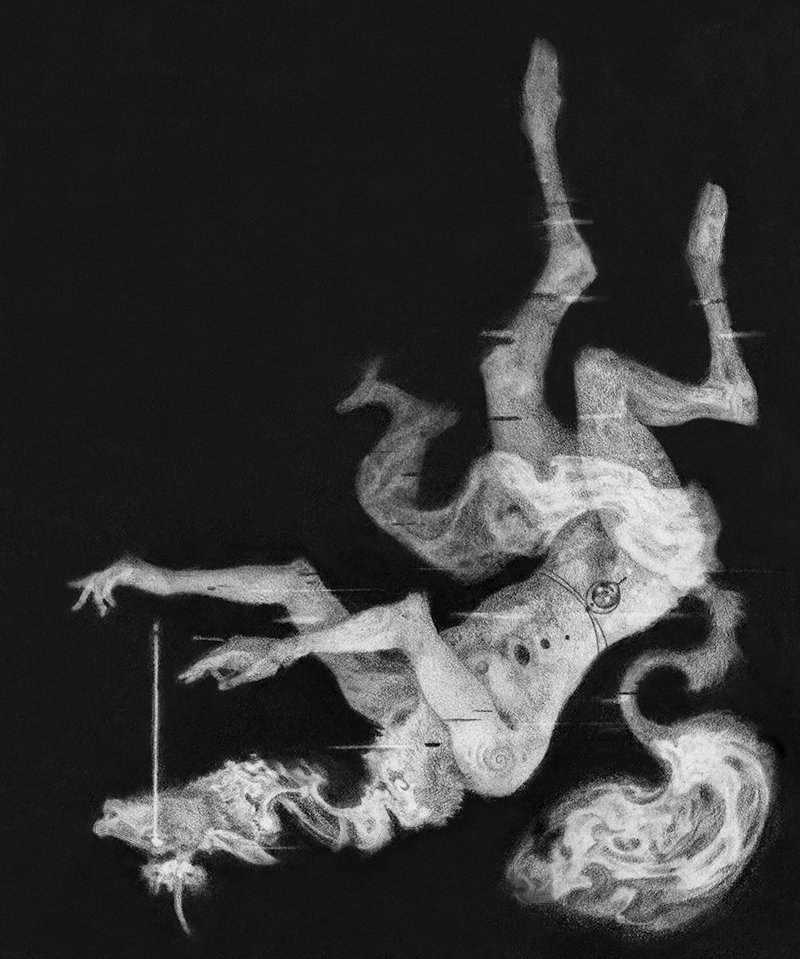
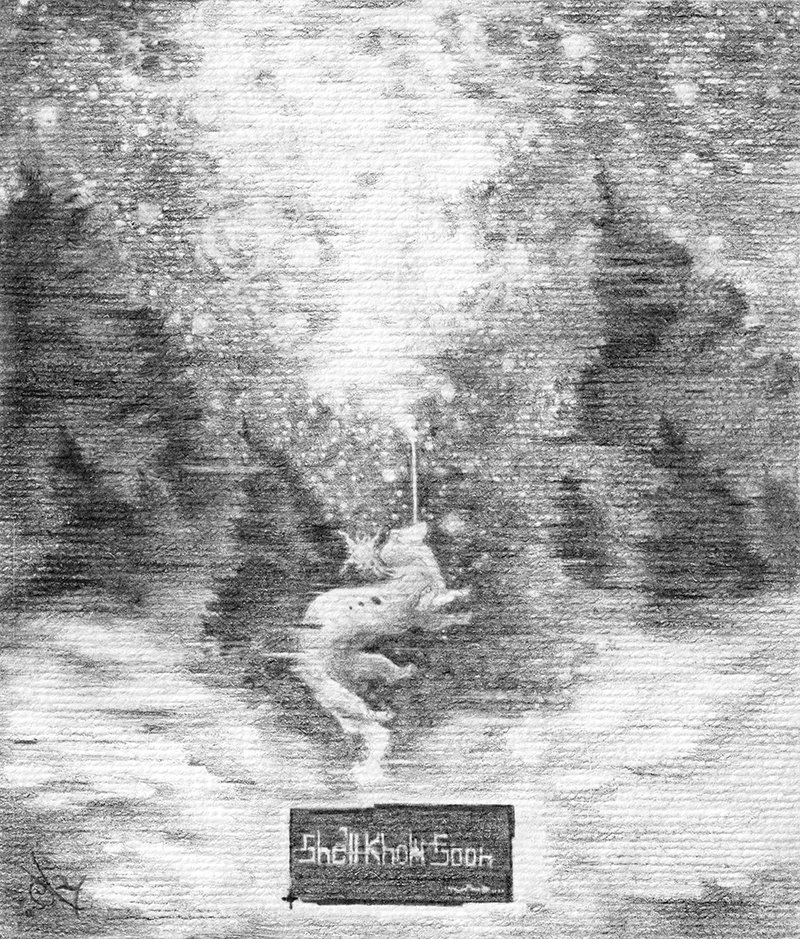
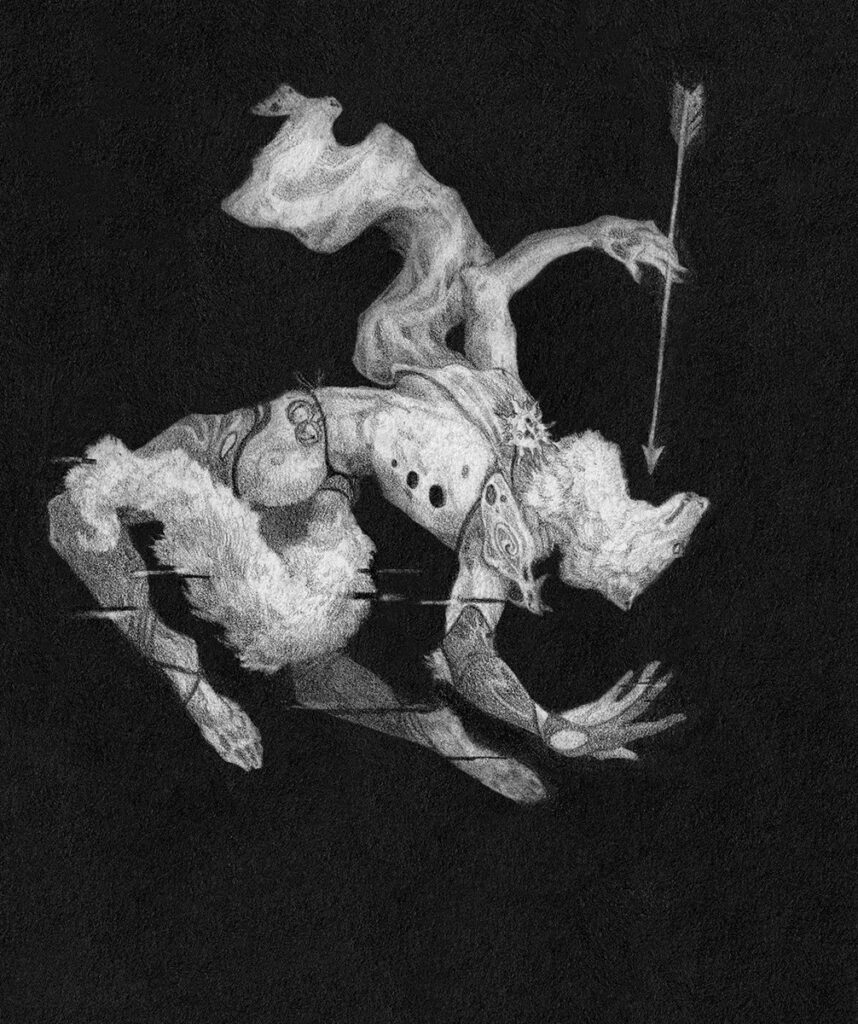
You’ve Surrendered to the Nightmare. So you’ve given yourself over to that bitter sleep? Though the way is bloody and the wounds still haunt you, you may pull from the source of your muse and return to the path where your body now lies without a soul to guide it.
——— Death screen for the Huntsmink
You’ve Succumbed to the Dream. If you’ve met with an untimely end, you can call upon your sacred muse and you may return to the path from whence you were vanquished. But be warned, my dear, you may yet be haunted by that which drove you so deep into the sleep.
——— Death screen for the Ochre Queen
Dreams and Inspiration
My muses don’t like to give me attention if I don’t offer them attention first
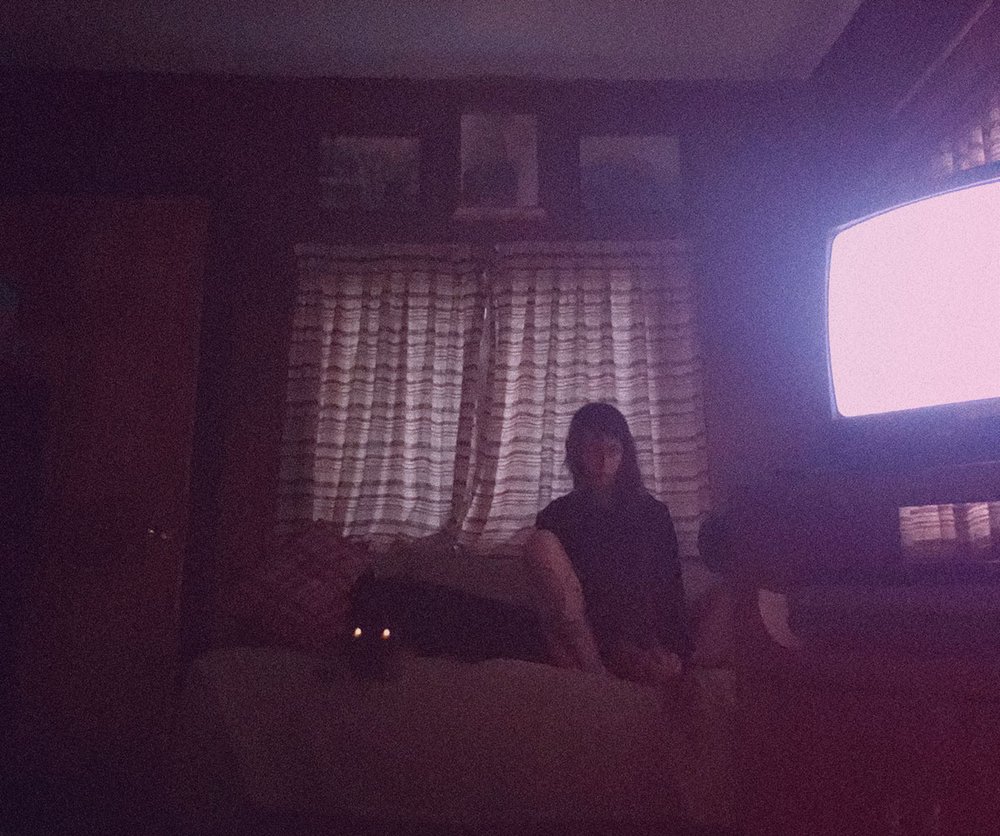
You’ve previously mentioned that you get some of your best inspiration from dreams and impactful life experiences, especially those that require emotional untangling.
One of my favorite artists, David Lynch, believes we draw our greatest ideas and inspirations from what he calls the “Unified Field” which we can tap into through dreams or transcendental mediation. Do you believe dreams go beyond our minds and can carry supernational or otherworldy messages to those willing to listen?
I have to agree with Lynch! I’m just one tiny speck of stardust in this universe, so I can’t hope to know the truth about anything, but for me, dreams have absolutely felt like they go beyond my own mind and play a larger, more symbolic role in my life and occasionally seem to seep out and touch other people I’m close to as well. It feels kind of silly to say that because plenty of my dreams are just stressful, boring dreams about past retail jobs. But sometimes I’ll go through periods of really intense fever dreams with colossal creatures, manifestations of my muses, and recurring visions of places I feel I’ve been to before, but can’t recall. Who knows, maybe it’s all meaningless in the grand scheme but it’s meaningful to me 🙂
What would you say to artists who struggle with inspiration, or feel like they’ve lost it along their journey?
Goodness, first, and I think most are aware of this, but it’s important to know just how much you’re not alone. I’ve been shocked by how many people, including my heroes, have admitted to similar struggles. I think every artist loses their way now and then. I’ve been there.
I can only speak from my own experience but for me, losing my way usually comes from fear. Fear of needing to put time into other things besides art making, otherwise X terrible thing might happen. For some, the fear may come from the idea that art isn’t worth pursuing, that such and such is more important, or that the creation isn’t going to be good enough so why bother? Over time, we stack these painful thoughts until they form a logical, practical wall in our brains thick enough to shut out the truth.
The realization can be so staggering once we understand what we’ve done, and I think for many of us, it’s a recovery process. Like healing an injury where we have to gently face the truth of where we’re at, and slowly learn to exercise our creative muscles again.
Art is hard for me, it always has been. I’ve never had a lot of natural skill in anything I’ve attempted so learning to do art has been a lot about discipline, not always motivation. But, I’ve never been more in love with anything else so I’ve learned to love the actual process of art making, challenges included. I far prefer the process of creating over the satisfaction of a “finished” piece and I think building that joy has helped me call on inspiration when I need it. My muses don’t like to give me attention if I don’t offer them attention first, so I try to honor that by always getting to work, and allowing them to come to me, even if it’s hard, even if it takes a while. The love and inspiration always return eventually, but only when I put in deep, intentional work and pay attention to what barriers or fears might be getting in my way.
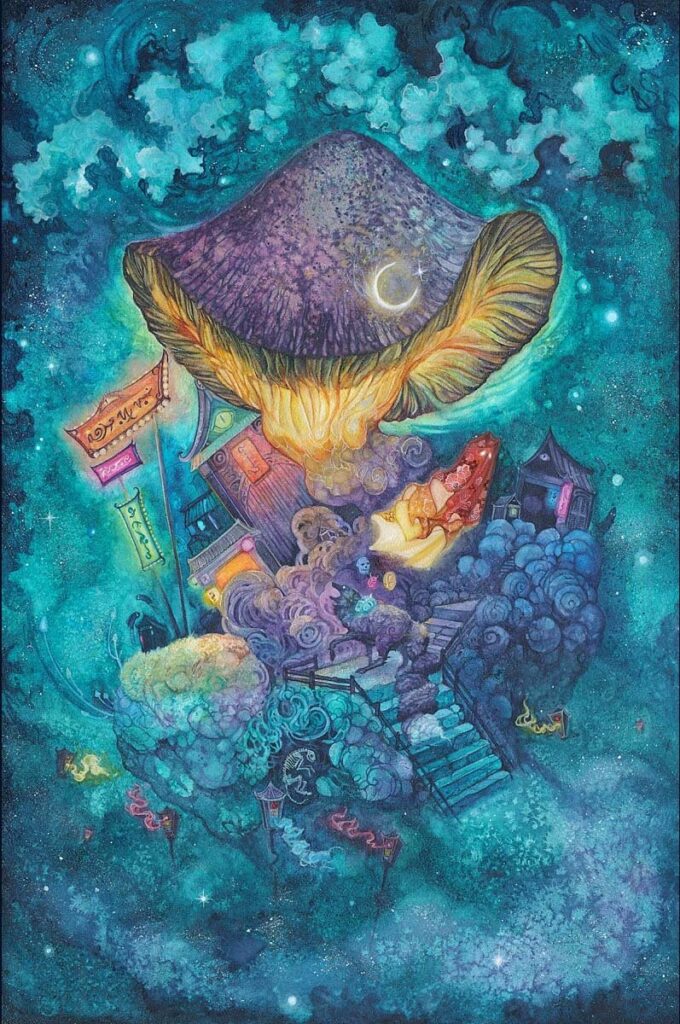
Art and Storytelling
It’s those early, wild explorations that eventually form a universe and I seriously think they’re sometimes more powerful early on.
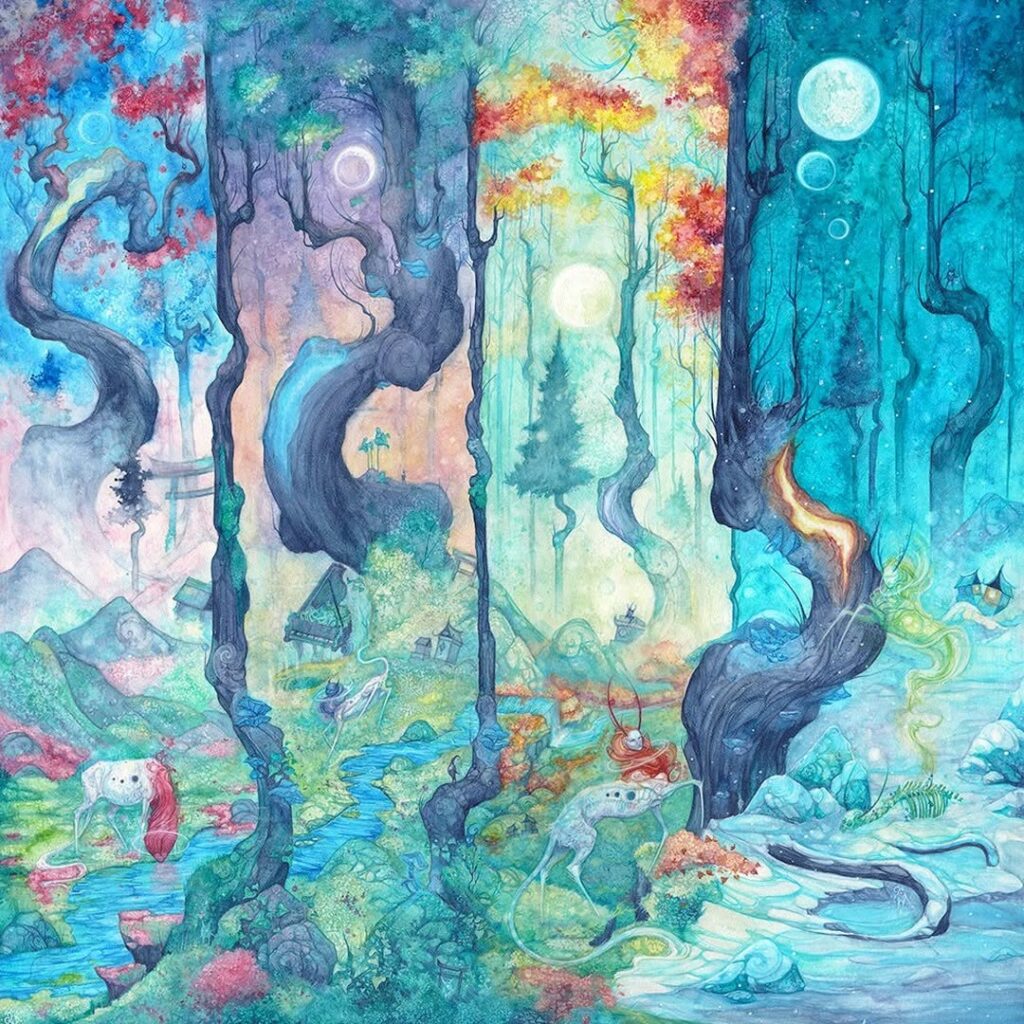
You’ve explicitly said you consider the recurring animals and monsters to be the characters who tell the story of your art.
Why did you gravitate toward visual media rather than written forms to tell these stories?
Words have always been a big passion of mine as well 🙂 I have a number of half-dead novel drafts from throughout my life that I just never finished. I don’t know why visual art was the thing I pursued relentlessly enough to make finished work, but I think I always knew I’d return to more of a narrative approach to my visual work which is another reason why making a fake video game appealed to me.
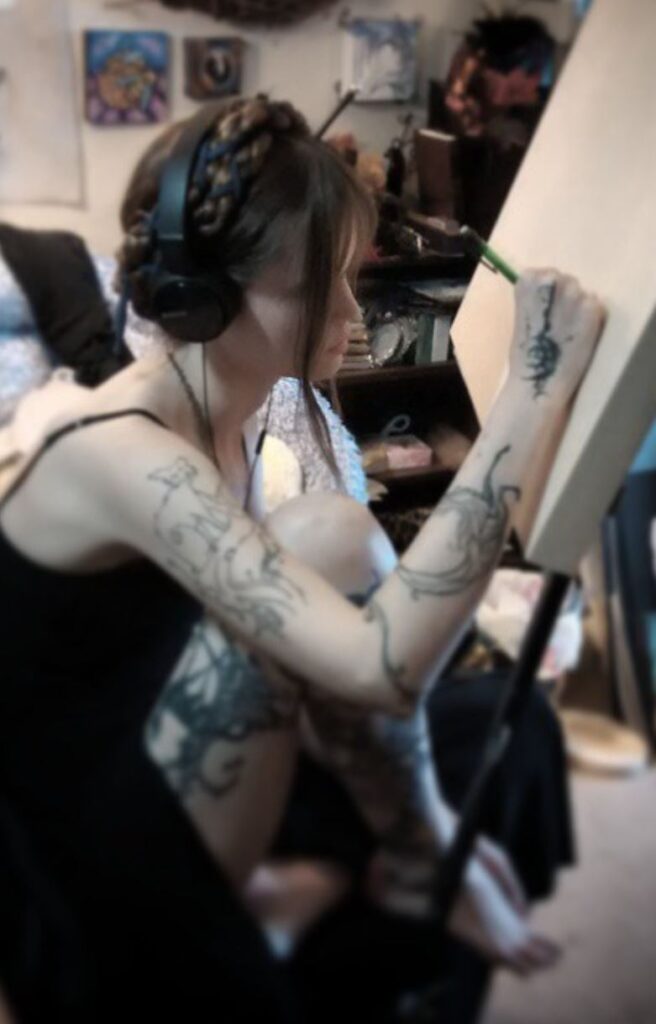
What would you say to people who have stories to tell but don’t have, or yet know, the language to give them life?
This is such an exciting, but scary phase to be in! I know it’s intimidating to be new to something you feel so much passion for but something I love in newer artists is how beautiful and free their sketchbooks or drafts of their work can be. So many ideas, so many styles just spilling out onto the page, messy, maybe, but so incredibly free. A lot of creators unfortunately lose that over time, and many of us envy it. The freedom of ideation without an existing voice, or the “skills” to say what you want to say can be really beautiful.
It’s those early, wild explorations that eventually form a universe and I seriously think they’re sometimes more powerful early on. I wish I could tell creators to hold onto that wild, playful, haphazard nature of being newer to art because it’s precious. I’ve felt more inspiration looking at the work of newer artists sometimes than I have seeing the art of veteran heroes of mine. Fall in love with your baby works, make them as free and messy as they can be, make them for yourself, and hold onto that exploration phase for the rest of your creative journey. It’s invaluable and it WILL become a language and voice of its own if you let it flourish freely.
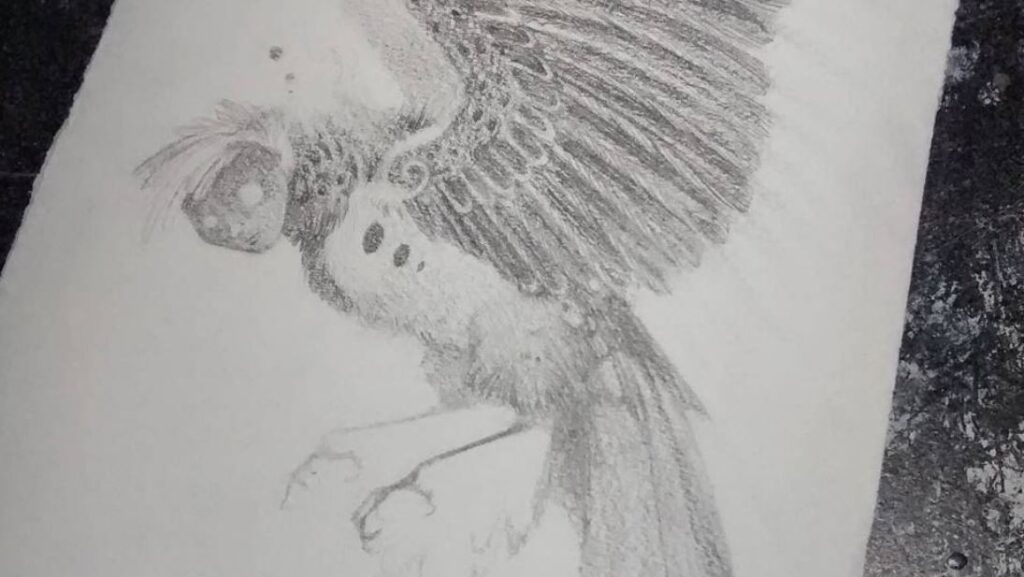
Artist and Audience
I make the visuals for myself, but I tell the stories for my audience
In your short documentary with Liquid Luck, you said that after painting “Purge the Smoke,” all your pieces have gotten “weirder and weirder” because you’ve put more of yourself in those works, whether people like it or not. I’ve always been fascinated by this relationship between the artist and their audience—how much art is personal versus created for others.
On one end of this spectrum is Henry Darger who created a lifetime of paintings all within his unique fantasy world and visual language and never showed them to anyone until his death. On the other end is Lewis Carrol who is said to have written Through the Looking Glass just to entertain a young Alice Liddel. I think there’s value in art both as a personal or therapeutic process and art as a way to connect or communicate with others.
Where do you think you might fall on this spectrum?
I agree with you that the connection with an audience can be a valuable and beautiful thing. I’m seriously floored and honoured that people give my work the time of day at all. Purge the Smoke was one of my most unpopular pieces at the time of its creation. The white mink from that painting recently appeared in a new painting as one of the protagonists from my Donne Toi la Lune project and, ironically, that new piece has become a best seller for me. These days my “weirder” art seems to have found its people due to an intentional shift in my audience. I feel that when we make work that’s true to our vision, we attract an audience for it. Some may say that makes me a bad business person, and maybe they’re right, but it makes me a happier artist.
Do you ever think about your audience when you create, and do you think it’s always valuable or appropriate for artists to be aware of these intentions or their audience when creating, or could that act as a barrier to inspiration?
Personally, I have to keep the idea of creating for anyone else out of it or I just hate creation in general. My one exception is the words I often put alongside my art. I make the visuals for myself, but I tell the stories for my audience. Most of my work has an underlying backstory, message, or piece of symbolism and I always hope that by sharing that, it might align with someone who needs to hear it. When it comes to the visuals though, I’m just too much of a selfish diva to think of anyone else in the creative process.
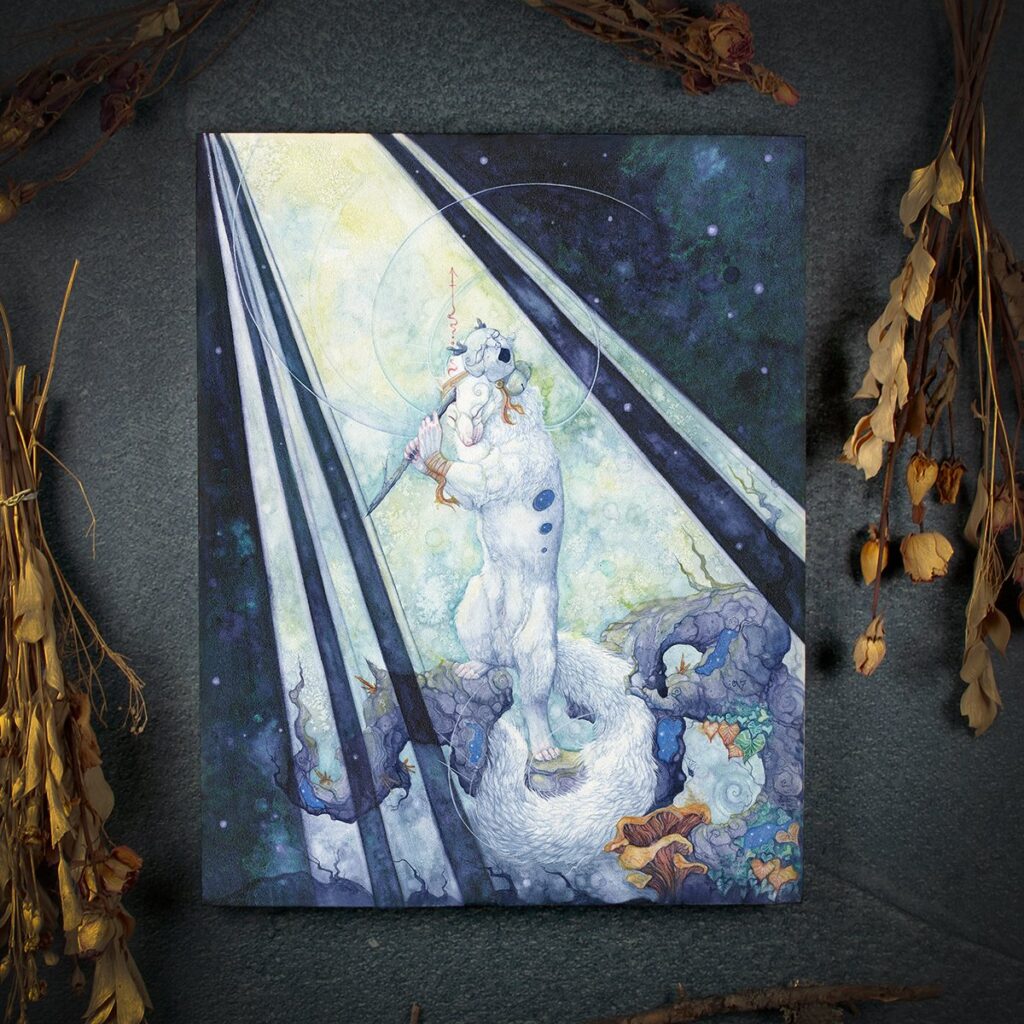
The Challenges of Creation
I can be a perfectionist, but I really only finish anything when I work on the skill of abandonment
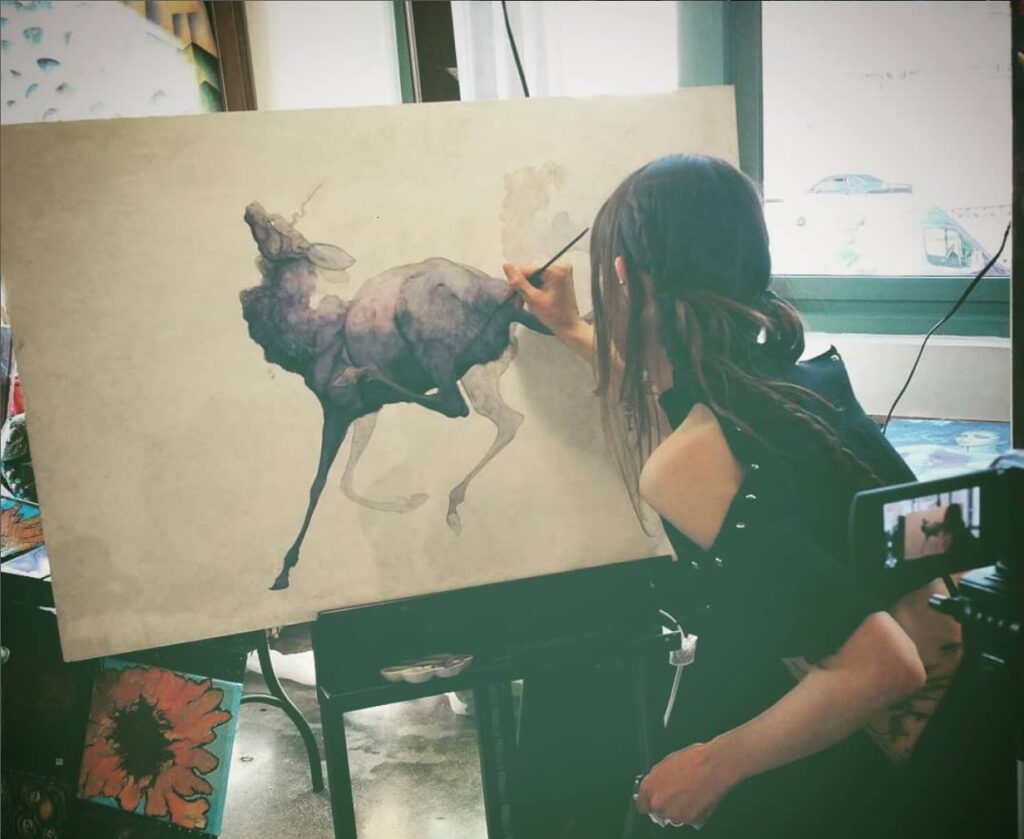
I’ve met so many talented folks who are paralyzed to pick up the same pencils or brushes that used to give them hours of joy in their childhood. It’s heartbreaking that something so fulfilling can become a burden when they feel creatively blocked.
I’ve personally struggled with finishing many projects I eagerly begin. Understanding and addressing my ADHD has helped me overcome some of these barriers, allowing me to create more consistently.
What are the largest challenges you face as an artist, and how do you continue to grow artistically despite them?
First, it’s incredible that you’ve been able to overcome so many barriers with your ADHD. That’s frankly an amazing feat. As someone who also struggles with balancing their own ADHD and neurodivergent brain, I feel that pain heavily. A lot of days are imperfect. Sometimes I feel such intense brain fog that I end up just crying on the floor. The very boring answer that’s helped me most is discipline, a love of the process, and a growth mindset. I don’t just grit through tasks mindlessly, I’ve had to get to know HOW I work, and what helps me specifically function. I have to be disciplined about following through with the systems I know help me.
Having a brain that both craves structure and rebels from it means I constantly feel like I’m trying to guide two wildly different animals pulling me in opposite directions. I take a lot of notes on what’s working and what’s not and I try to learn from the difficulty I’m having. I don’t think there’s one simple answer, but I do believe there’s a major benefit to self-observance with a mindset aimed at accepting the imperfections and learning from them. Another thing that’s been a huge help to me is caring for my physical health. I wish I could state just how important our physical health is to our mental health, and thus our creative process. For me, it’s been a necessity due to some chronic health issues, but I believe everyone can benefit from this kind of care.
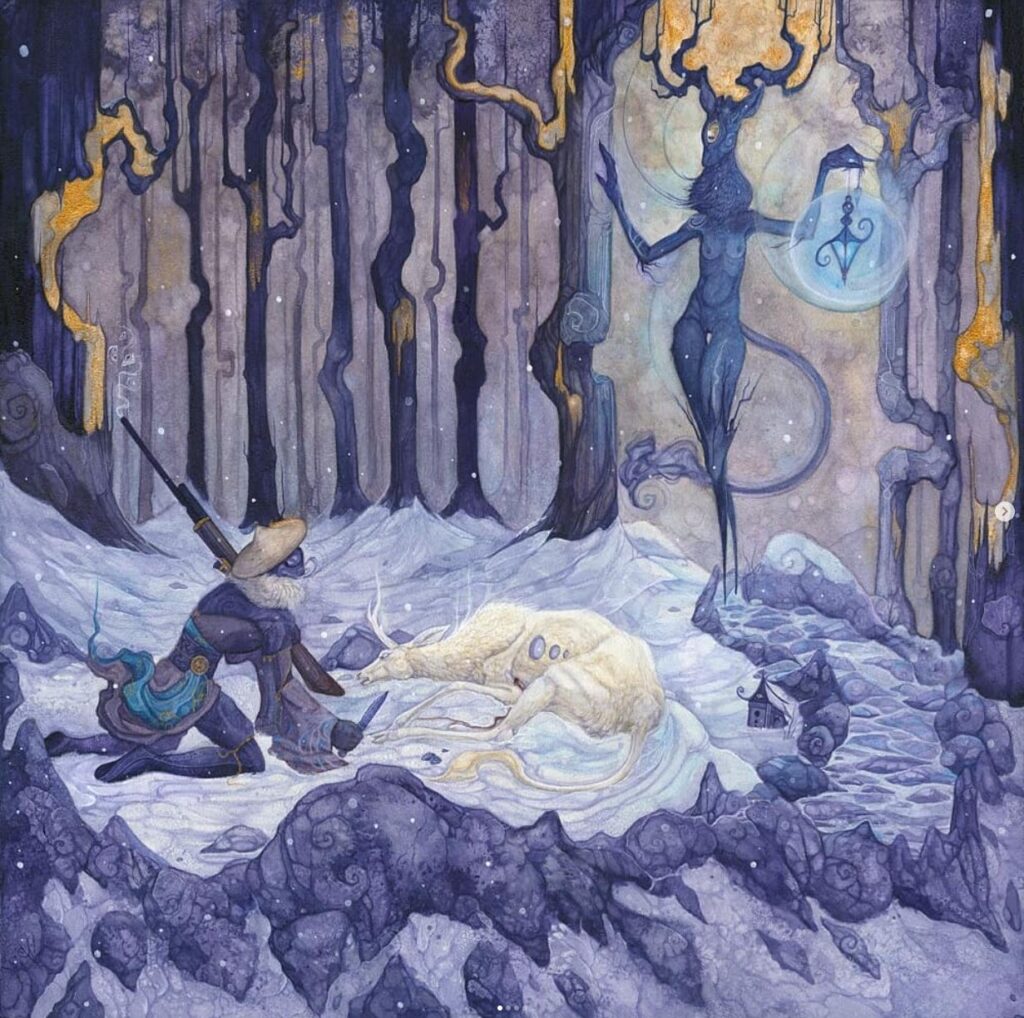
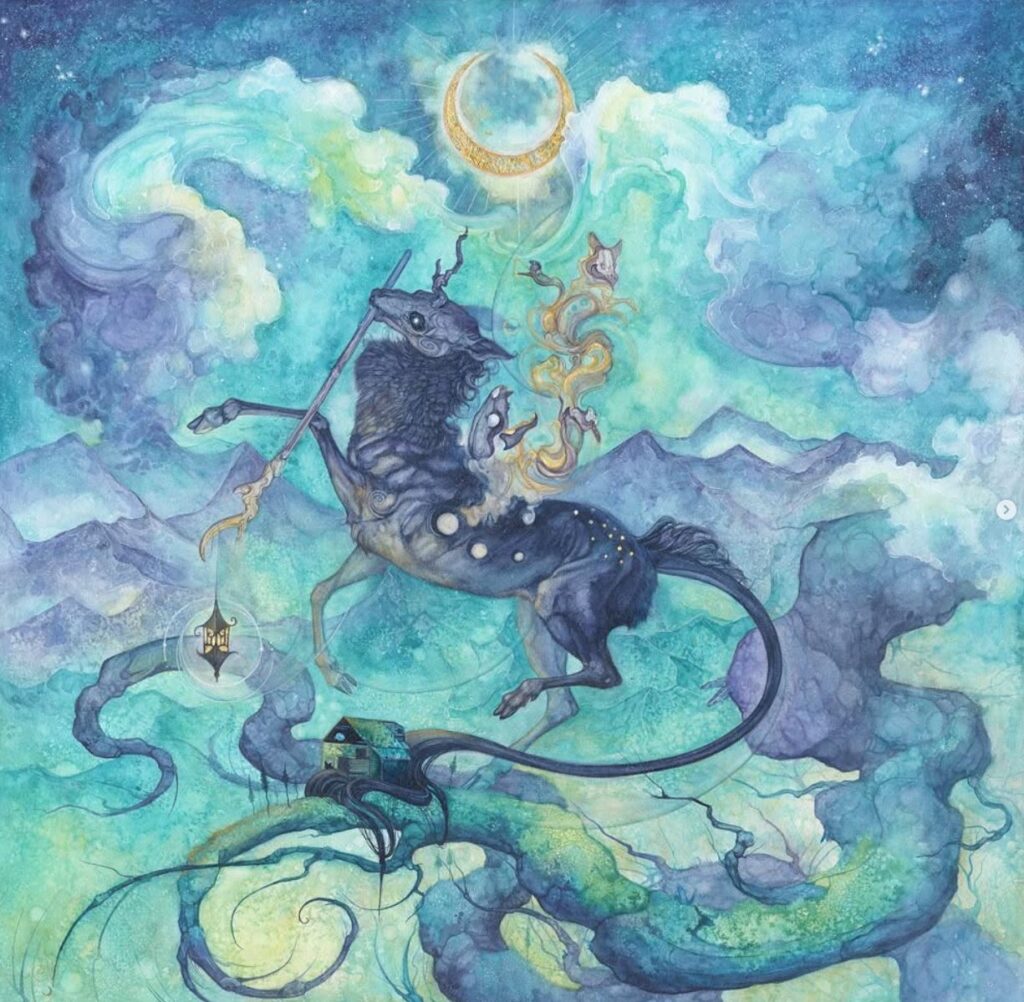
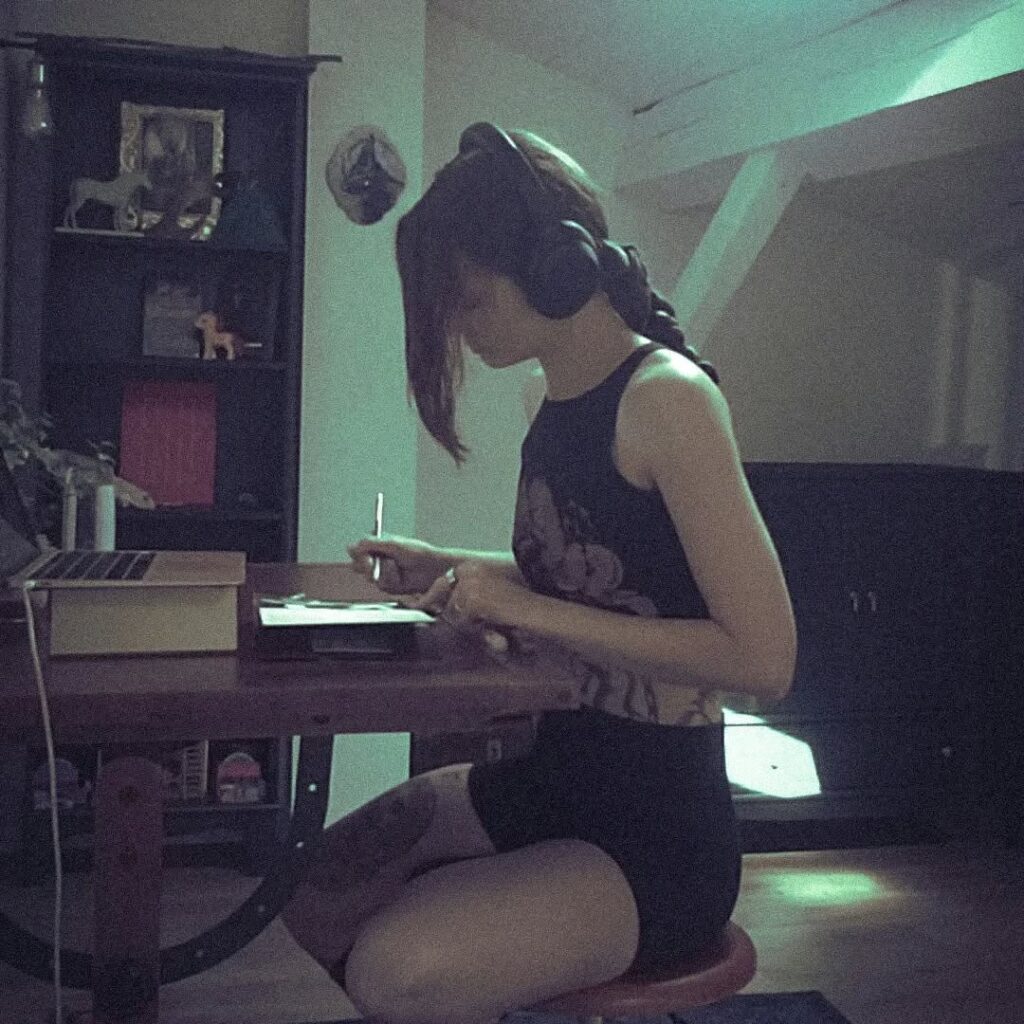
You’ve mentioned music as a valuable catalyst for your creativity. For me, there’s a direct connection between finding music that moves me and finding creative ideas and inspiration. The downside is when I can’t find the right music, my creative productivity goes out the window.
Are you ever worried or have you ever found that a source of inspiration like music, can become a crutch if the musical well runs dry?
Music is definitely fuel for me but strangely, and I never thought this would happen, as I’ve come to terms with some aspects of my neurodivergence and worked on them, I’ve found myself being able to work in silence. This is truly a revolution for me that I never thought possible. I don’t think working in silence is important by any means, but I do think it gave me a unique insight into myself and made me realize that by minimizing “noise” to process the things I was using it to block out, I was able to unlock a way of working without needing noise at all. …Though I admit, music does blast in my head almost 24/7 loud enough to drown out intrusive thoughts a lot of the time. And I do still listen to music and other media while working, just not as often, and not when I sense I’m using it to drown out the internal things I should otherwise be listening to.
Technology is a double-edged sword for many artists and creators. There has never been more inspiration, networking, tutorials, and general creative tools at our fingertips. At the same time, there have never been more never-ending distractions, and dopamine sinks competing for our attention.
Have you had any struggles or breakthroughs because of technology in your creative journey?
I agree with you that it’s a double-edged sword. I dislike all the distracted, over-stimulated nature of how things are in a lot of ways, but I also have a career in art largely because of the internet. I met my wife and many of my closest friends online. Not to mention the games that so inspired me as a child and the tools that have allowed me to share and create my work. Even if I hate aspects of my phone, social media, and how impatient it feels like the world is, I know I’d be lying if I said technology was all bad.
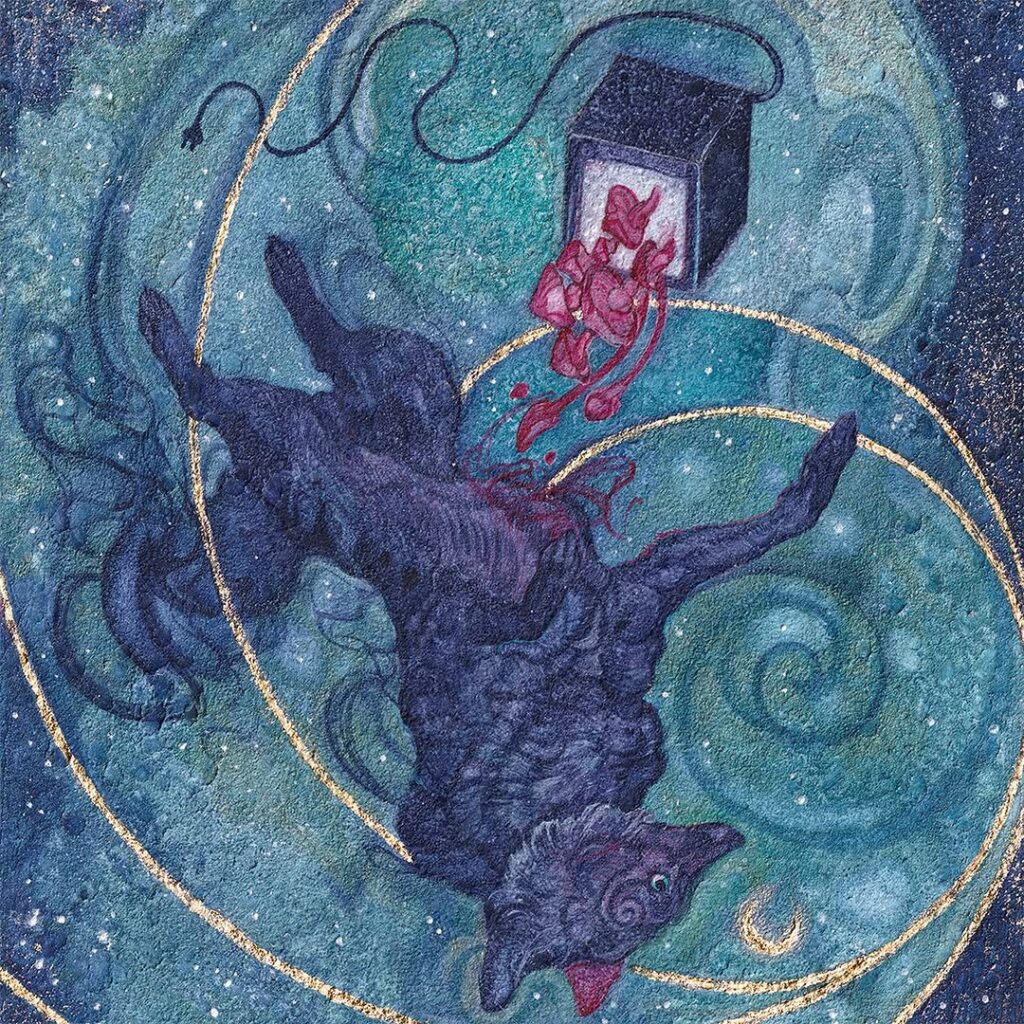
If you could wave a magic wand to bring the world back to a time before the internet or smartphones, would you?
I don’t think I would. As much as I detest some of what’s happening with technology today (AI art for one), not all technology is bad. I just hope we learn to find more of a balance with it. Patience and focus seem to be growing very thin for our world and I’d love to see people be able to slow down more and, enjoy the act of human creation instead of the awful churning-out of content it feels we’re being pushed toward.
Finally, is there one piece of advice that stuck with you that you’d like to share with others?
The quote ‘Done is better than perfect’ really stands out to me. I can be a perfectionist, but I really only finish anything when I work on the skill of abandonment. That’s not to say don’t finish anything, rather, it’s about starting a project and being okay with letting it be finished while knowing you’ll never find the results to be perfect. I don’t think I could ever find anything I do to be perfect and that’s a huge part of why chasing mastery and creativity keeps me coming back to art, and exploring so many concepts which I wouldn’t get to if I never allowed myself to call a piece “finished”
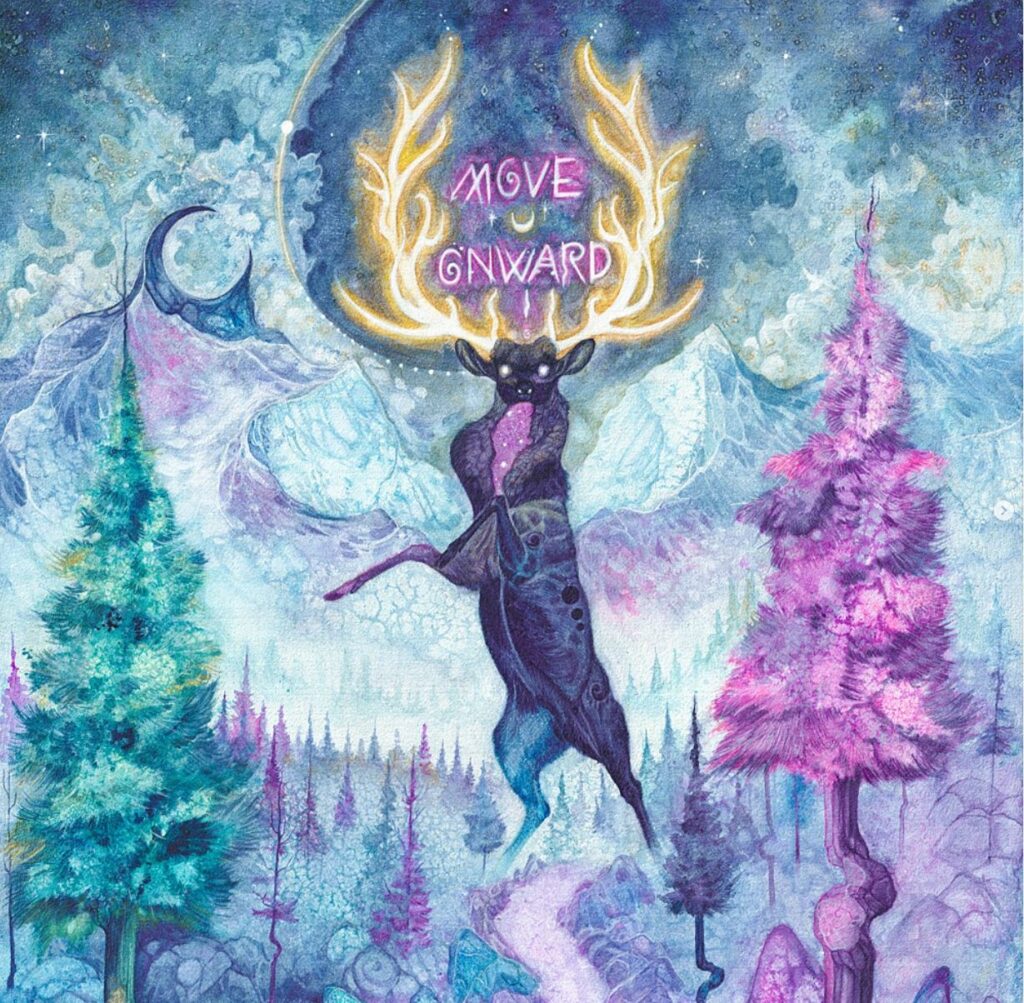
I want to thank Aria so much for this interview and for being this series’ debut feature and collaborator! I can’t wait to see more of Donne Toi la Lune and all her future endeavors.
Check out her Linktree for links to all her social media pages and her website and follow her to see what she’s dreaming up. You can also sing up for her newsletter to get direct updates.
Look out for future Common Threads installments where I’ll continue to explore the creative process with other artists and creators. I have some exciting ideas for the future of this series and how it will evolve. Please comment any thoughts or ideas below, I always appreciate the input!
